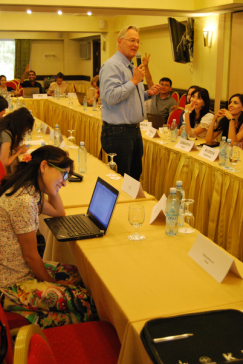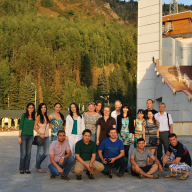EUCAIS Workshop and International Conference on “Prospects of EU-Central Asia Relations” held in Almaty, Kazakhstan

The Institut für Europäische Politik(IEP) and its partner the Centre International de Formation Européenne(CIFE) have organized a workshop and an international conference in Almaty, Kazakhstan from the 24th to the 31st of August 2014. This was done in the context of the second run of our EUCAIS (Europe and Central Asia in the International System) Master programme, funded by the Volkswagen Foundation and EU’s Lifelong Learning Programme. A total of 70 participants gathered at the conference in Almaty, made up of EUCAIS students, several EUCAIS alumni and a number of speakers and attendees. The workshop pursued the Master programme, with examination of previous courses and lectures on new topics like European and International Law (Prof. Dr. Mueller-Graff, University of Heidelberg), EU Energy Policy (Prof. Dr. Mathias Jopp, IEP Berlin), Sustainable Development (Dr. Laurent Baechler, CIFE) and Regionalism in Comparative Perspective (Dr. Sebastian Krapohl, University of Amsterdam).
The International Conference, embedded in the workshop programme, provided an opportunity for intense analysis and discussion on intra-regional Central Asian issues, around topics like conflict resolution and security, development paths and external interests involved in this multi-facetted region at the crossroads of Eastern and Western cultures and Great Powers. Experts from Kazakhstan, Kyrgyzstan, Tajikistan, Uzbekistan, Kashmir on the one hand and Europe (France, Germany, Greece and Latvia) on the other contributed to shape a picture of internal and external relations and influences in Central Asia, which was fascinating by its complexity and posed an intellectual as well as a political challenge. Universities and think-tanks (e.g. the German-Kazakh University, the Al-Farabi State University, KIMEP-University and the OSCE Academy), governments (the Ambassador of Latvia, addressing the agenda of its EU Presidency) and the European Commission (represented by Gerhard Sabathil, Director at the External Action Service) guaranteed the academic quality and practical applicability of the debates.
The EUCAIS programme is step by step becoming a success story; it can attract academics from within the region and can already rely on its own alumni network on the spot, with young professionals teaching and acting in regional universities, administrations and in the diplomatic sphere. On the other side Europeans, like the staff of IEP and CIFE and their academic networks were present in the region during this programme, gaining new experience and insight into the complex problems and opportunities of EU-Central Asia relations and intra-regional development. Learning from each other is a central axis of IEP’s Central Asian focus.
The workshop, as the whole EUCAIS programme, first and second run, provided one more opportunity for smooth and efficient cooperation between IEP and CIFE, thanks to generous funding of the Volkswagen Foundation, as well as the European Union. Encouraged by this outstanding event, IEP and CIFE will mobilise and join their energies to establish EUCAIS as a sustainable platform for academic education addressing the relations between Europe and Central Asia.

